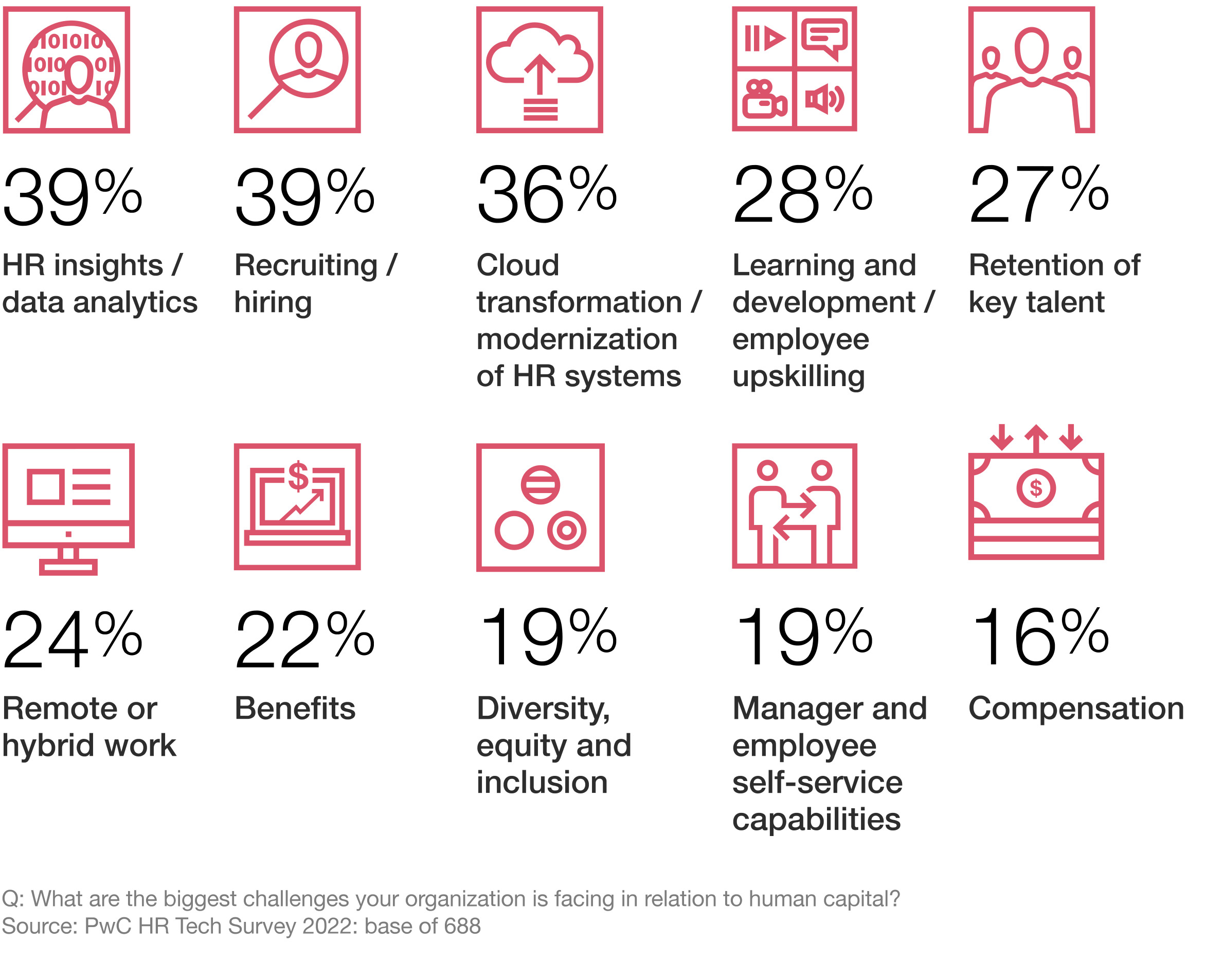Table of Contents
Think for a moment about the repetitive and rigid tasks within your business. How much time does your HR team spend sorting through resumes, putting aside those that meet a specific set of criteria? How much time does your team spend updating customer details and processing their information?
Robotic Process Automation (RPA) handles these manual, repetitive tasks so your team can focus on activities that add value to the business. RPA does not replace humans; it works alone or with humans to save time and effort. Whether you run an insurance firm or a healthcare facility, your business can benefit from numerous robotic process automation use cases.
Ninety per cent of organisations worldwide will adopt a form of RPA by 2022.
1. Robotic process automation use cases in HR
RPA in HR primarily focuses on streamlining the onboarding process, which includes hiring and recruitment for candidates and employees. However, the responsibilities of HR extend beyond recruitment to also include building engagement among employees within the company. According to Gallup’s State of the Global Workplace report, 87% of employees worldwide are not engaged or actively disengaged at work, resulting in an estimated cost of approximately $7 trillion due to lost productivity. While it is HR’s responsibility to keep employees engaged, it is not always feasible, as they are occupied with repetitive tasks.
Therefore, RPA is designed to assist in automating these repetitive tasks, enabling HR to concentrate on enhancing employee productivity through effective performance management, fostering employee engagement, improving the company’s brand in a competitive job market, and making data-driven decisions with the help of people analytics.

2. Virtual agents as robotic process automation use cases
RPA can mimic human speech and behaviour through machine learning. As modern customers often expect 24/7 access to customer service, RPA can answer simple enquiries while your customer service department is offline.
Beyond better access to customer service, RPA can back contact centre agents by handling simple customer requests such as pricing or stock enquiries. This robotic process automation use case frees employees from handling basic interactions so they can serve customers with complex queries. It also frees customer service representatives from answering repetitive questions.
3. Handwriting recognition for ingestion into ERP
Handwriting recognition by RPA captures handwriting in an image and converts it to text. The robot then leverages that text to identify, index, and transform the text. After that, RPA can ingest the data into business systems, such as enterprise resource planning (ERP).
RPA in this scenario removes reliance on paper documents and manual data entry processes while improving the accuracy of captured information. Additionally, this positively impacts compliance because it reduces errors made when entering data into the system.
4. Managing client information with robotic process automation
RPA can update customer information by identifying issues in data and resolving them without human intervention. RPA quickly and accurately updates customer information, such as adding product purchases or updating billing statements.
You might also have client information stored on two separate platforms. RPA can transfer and check this data to ensure both systems have the same, up-to-date data. Your team can focus on value-adding activities while RPA updates client information, quickly and accurately.
“Companies will focus their automation efforts on helping remote employees be more effective, with one in four information workers receiving help from software bots, robotic process automation, and AI.” Forrester.
5. Automating account reconciliation in financial services
Account reconciliation is a standard process that arises for financial services and insurance companies. It usually includes comparing bank records with customer statements and correcting discrepancies with paper copies of checks, drafts or other transactions.
These RPA use cases can accelerate business operations to automate time-consuming tasks without costing more money, time or effort. Automation can reduce the number of duplicate payments made, verify bank statements without human intervention and complete processes quickly. Faster back-office processes not only enhance how your team works, but can enhance customer satisfaction by improving speed of service.
6. Robotic process automation use cases for processing claims
Claims processing is a time consuming and repetitive task that RPA can accelerate. Robotic process automation will handle all tasks, from identifying, retrieving, and matching data with a claim server to sending statements to insurance carriers.
RPA for processing healthcare or insurance claims can reduce the time and human effort needed. RPA can quickly and accurately process insurance claims and analyse data to detect fraud or encrypt data when needed. It also reduces errors which results in faster claim processing times.
7. Patient registration in healthcare facilities
Hospitals see a large number of people flowing in and out each day. The same people might return for a separate health issue, or people with similar conditions might visit a similar ward. Patient registration often includes manual work from healthcare workers updating logbooks.
RPA enables hospitals to carry out accurate records on the number of patients admitted into the hospital each day. This ease of data collection has helped hospitals improve their patient admissions system and decrease the time taken for handling new patients. RPA has also helped monitor operating theatres, thereby reducing human errors in this area.
“Technology-driven innovation holds the potential to improve our understanding of patients, enable the delivery of more convenient, individualised care—and create $350 billion–$410 billion in annual value by 2025.” McKinsey.
8. Robotic process automation use cases in compliance reporting
RPA can improve accuracy in compliance reporting by automatically collecting and analysing data. Employees can become more productive with fewer errors in RPA. Your team can focus on tasks that require human precision, such as software testing, building a website or making an accounting entry.
RPA automates data flow between siloed systems or departments with little collaboration. RPA reduces costs by speeding up processes and reducing errors when merging data from multiple systems, so can deliver accurate reporting from all of your departments.
9. Invoice processing and management
Invoice processing and management is a crucial aspect of business operations. It involves handling and organising invoices from suppliers, ensuring accuracy, and managing payments promptly. Efficient invoice processing and management contribute to streamlined financial operations, improved cash flow, and effective budget management.
With the aid of technology like RPA, organisations can automate and optimise these processes, reducing manual effort, minimising errors, and enhancing overall efficiency.
Furthermore, effective invoice processing and management enables businesses to maintain a transparent and auditable record of financial transactions. By leveraging automation tools companies can easily capture and digitise invoice data, extract relevant information, and integrate it with their accounting systems.
10. Data migration and integration
Data migration and integration play a vital role in ensuring the smooth transfer of data between different systems and applications. It involves the movement and consolidation of data from legacy systems to new platforms, as well as the synchronisation and harmonisation of data across various databases and software. Successful data migration and integration enable organisations to maintain data integrity, enhance data accessibility, and improve overall business processes.
By leveraging advanced tools and technologies, businesses can streamline data migration and integration processes, reduce manual effort, minimise data errors, and ensure data consistency and accuracy across the organisation. Effective data migration and integration pave the way for seamless data flow, better decision-making, and increased operational efficiency, ultimately driving business growth and success.
Experteq can design your RPA solution
If you are looking to improve the accuracy of back-office processes, then RPA could be the next step for your organisation. RPA can drive efficiency in rules-based processes for healthcare, government and financial services organisations.
Experteq RPA can execute faster deployments, integrate legacy and modern business systems, and improve efficiency across your business. We leverage industry-leading RPA tools and can take your solution from concept through to implementation. Furthermore, RPA functions as an addition to your current IT infrastructure and will not disrupt the technology you currently leverage.
Read our brochure for more on implementing RPA in your business.






